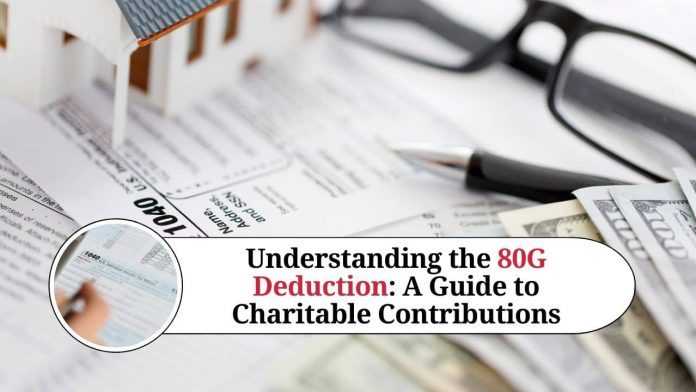The Indian government offers several tax benefits to individuals who donate to registered charitable organizations. One such benefit is the 80G deduction, which allows taxpayers to claim a deduction on the amount donated to eligible institutions. In this article, we will discuss the 80G deduction in detail, including its eligibility criteria, deduction limits, and the process of claiming the deduction.
Eligibility Criteria for 80G Deduction
To claim a deduction under Section 80G, the following conditions must be met:
The donation must be made to an eligible organization: Only donations made to registered charitable institutions qualify for the 80G deduction. The institution must have a valid 80G certificate issued by the Income Tax Department.
The mode of payment: Donations made in cash exceeding Rs. 10,000 are not eligible for the 80G deduction. Only donations made through cheque or digital payment modes such as NEFT, RTGS, or credit card are eligible for the deduction.
The amount of the donation: The amount donated must be a minimum of Rs. 500 to claim the 80G deduction.
Deduction Limits under Section 80G
The amount of deduction available under Section 80G varies depending on the type of charitable institution and the percentage of the donation that is eligible for a deduction.
100% deduction: Donations made to certain institutions such as the Prime Minister’s National Relief Fund, the National Defense Fund, and the National Foundation for Communal Harmony are eligible for a 100% deduction without any upper limit.
50% deduction: Donations made to other eligible institutions are eligible for a 50% deduction. However, this deduction is subject to an upper limit of 10% of the taxpayer’s gross total income.
No deduction: Donations made to institutions that are not eligible for the 80G deduction, such as political parties and religious organizations, do not qualify for any tax deduction.
Process of Claiming the 80G Deduction
To claim the 80G deduction, taxpayers must provide the following details in their income tax returns:
Name of the charitable institution: Taxpayers must provide the name and address of the institution to which the donation was made.
PAN number of the charitable institution: The PAN number of the charitable institution must be provided to claim the 80G deduction.
Donation amount: The amount donated to the eligible institution must be mentioned in the income tax return.
80G certificate: Taxpayers must attach a copy of the 80G certificate issued by the charitable institution to their income tax return.
Conclusion
The 80G deduction is a valuable tax benefit offered by the Indian government to encourage individuals to donate to registered charitable institutions. Taxpayers who donate to eligible organizations can claim a deduction on the amount donated, reducing their taxable income and tax liability. It is important to note that only donations made through cheque or digital payment modes are eligible for the 80G deduction, and donations made to political parties and religious organizations are not eligible. To claim the 80G deduction, taxpayers must provide the name and PAN number of the charitable institution, the amount donated, and a copy of the 80G certificate issued by the institution. By taking advantage of the 80G deduction, taxpayers can contribute to the betterment of society while also enjoying tax benefits.
Frequently Asked Questions
Q. What is the 80G deduction?
The 80G deduction is a tax benefit offered by the Indian government that allows taxpayers to claim a deduction on the amount donated to registered charitable institutions.
Q. What are the eligibility criteria for the 80G deduction?
To claim the 80G deduction, the donation must be made to an eligible organization with a valid 80G certificate issued by the Income Tax Department. The mode of payment must be through cheque or digital payment modes, and the amount donated must be a minimum of Rs. 500.
Q. How much deduction is available under Section 80G?
The amount of deduction available under Section 80G varies depending on the type of charitable institution and the percentage of the donation that is eligible for a deduction. Donations made to certain institutions are eligible for a 100% deduction without any upper limit, while donations made to other eligible institutions are eligible for a 50% deduction with an upper limit of 10% of the taxpayer’s gross total income.
Q. Which institutions are eligible for the 80G deduction?
Only donations made to registered charitable institutions with a valid 80G certificate issued by the Income Tax Department are eligible for the 80G deduction. Political parties and religious organizations are not eligible.
Q. What is the mode of payment for the 80G deduction?
Only donations made through cheque or digital payment modes such as NEFT, RTGS, or credit card are eligible for the 80G deduction.
Q. What is the minimum amount of donation required to claim the 80G deduction?
The minimum amount of donation required to claim the 80G deduction is Rs. 500.
Q. How do I claim the 80G deduction?
To claim the 80G deduction, taxpayers must provide the name and PAN number of the charitable institution, the amount donated, and a copy of the 80G certificate issued by the institution in their income tax return.
Q. What are the benefits of the 80G deduction?
The 80G deduction allows taxpayers to contribute to the betterment of society while also enjoying tax benefits. By claiming the deduction, taxpayers can reduce their taxable income and tax liability.




















